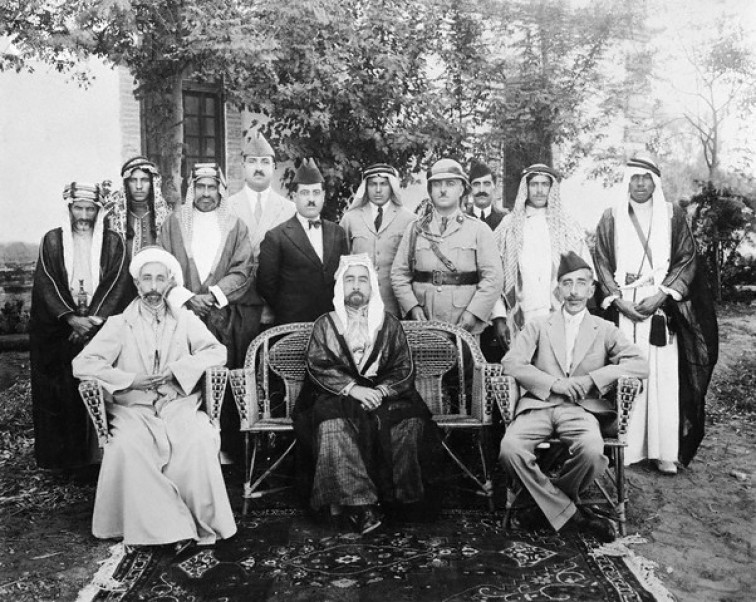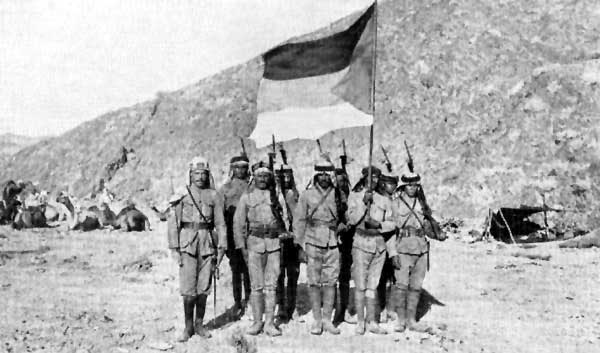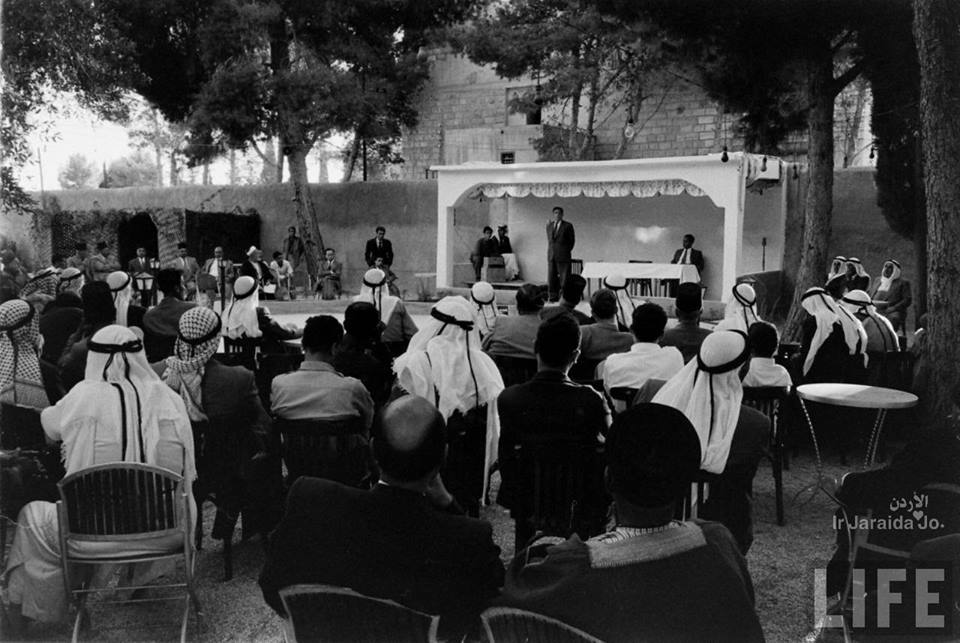|
1957 Alleged Jordanian Military Coup Attempt
The 1957 alleged Jordanian military coup attempt refers to violent confrontations on 13 April 1957 at the large army barracks in Zarqa between royalist, mostly Bedouin units, loyal to King Hussein, and Nasserist-style Arab nationalist units. A military maneuver named "Operation Hashem" was initiated on 8 April and it encircled the capital Amman. When Hussein asked Ali Abu Nuwar (Army chief of staff) about the maneuver he claimed that it was a normal military exercise. Hussein, suspicious that this was a show of strength by Abu Nuwar to overthrow him and enter a union with Nasserist Egypt, ordered Abu Nuwar to withdraw the unit which he heeded. The Arabist government of Suleiman Nabulsi was forced to resign on 10 April after its policies clashed frequently with that of the Palace. On 13 April, rioting broke in the Zarqa barracks, Hussein (aged 21) went to end the violence between royalist and Arabist units after the Arabists spread rumors that Hussein was killed. A 3,000-man ... [...More Info...] [...Related Items...] OR: [Wikipedia] [Google] [Baidu] |
Arab Cold War
The Arab Cold War ( ar, الحرب العربية الباردة ''al-Harb al-`Arabiyyah al-bāridah'') was a period of political rivalry in the Arab world from the early 1950s to the late 1970s as part of the broader Cold War. The generally accepted beginning of the Arab Cold War was the Egyptian revolution of 1952, which ultimately led to Gamal Abdel Nasser becoming President of Egypt in 1956. Thereafter, newly established Arab republics defined by revolutionary secular Arab nationalism, nationalism, and largely drawing inspiration from History of Egypt under Gamal Abdel Nasser, Nasser's Egypt, were engaged in political rivalries of varying degrees of ferocity with conservative traditionalist Arab monarchies, led chiefly by Saudi Arabia. The approximate end point of this period of internecine rivalry and conflict is generally viewed as being the 1979 Iranian Revolution, which culminated in the installation of Ruhollah Khomeini, Ayatollah Ruhollah Khomeini as the leader of Iran ... [...More Info...] [...Related Items...] OR: [Wikipedia] [Google] [Baidu] |
Hussein Of Jordan
Hussein bin Talal ( ar, الحسين بن طلال, ''Al-Ḥusayn ibn Ṭalāl''; 14 November 1935 – 7 February 1999) was King of Jordan from 11 August 1952 until his death in 1999. As a member of the Hashemite dynasty, the royal family of Jordan since 1921, Hussein was a 40th-generation direct descendant of Muhammad. Hussein was born in Amman as the eldest child of Talal bin Abdullah and Zein al-Sharaf bint Jamil. Talal was then the heir to his own father, King Abdullah I. Hussein began his schooling in Amman, continuing his education abroad. After Talal became king in 1951, Hussein was named heir apparent. The Jordanian Parliament forced Talal to abdicate a year later due to his illness, and a regency council was appointed until Hussein came of age. He was enthroned at the age of 17 on 2 May 1953. Hussein was married four separate times and fathered eleven children including King Abdullah II of Jordan. Hussein, a constitutional monarch, started his rule with what was te ... [...More Info...] [...Related Items...] OR: [Wikipedia] [Google] [Baidu] |
Bahjat Al-Talhouni
Bahjat Talhouni ( ar, بهجت التلهوني; 1913 – January 30, 1994) was a Jordanian political figure. He served as the 14th Prime Minister of Jordan between 1960 and 1970 for six different terms. Talhouni was Prime Minister from August 1969 to June 1970, during a particularly turbulent time of friction and skirmishes between the Government and thousands of Palestinian guerrillas who were then in Jordan. The Palestinian guerrillas, members of various organizations, frequently disregarded Jordanian laws and came to be almost a state within a state. In February 1970, King Hussein of Jordan met with their leaders at Talhouni's house in Amman. At that meeting the King agreed not to enforce restrictions on the Palestinians carrying firearms in Jordanian towns, and the leaders of the guerrillas promised to try to make their followers less unruly. A strained and often interrupted truce ensued. Then came an unsuccessful attempt on the King's life in June. Angered, the Jordan ... [...More Info...] [...Related Items...] OR: [Wikipedia] [Google] [Baidu] |
Hashemite
The Hashemites ( ar, الهاشميون, al-Hāshimīyūn), also House of Hashim, are the royal family of Jordan, which they have ruled since 1921, and were the royal family of the kingdoms of Hejaz (1916–1925), Syria (1920), and Iraq (1921–1958). The family had ruled the city of Mecca continuously from the 10th century, frequently as vassals of outside powers, and were given the thrones of the Hejaz, Syria, Iraq, and Jordan following their World War I alliance with the British Empire; this arrangement became known as the "Sharifian solution". The family belongs to the Dhawu Awn, one of the branches of the Ḥasanid Sharifs of Mecca, also referred to as Hashemites. Their eponymous ancestor is traditionally considered to be Hashim ibn Abd Manaf, great-grandfather of the Islamic prophet Muhammad. The Ḥasanid Sharifs of Mecca (from whom the Hashemite royal family is directly descended), including the Hashemites' ancestor Qatadah ibn Idris, were Zaydī Shīʿas until the l ... [...More Info...] [...Related Items...] OR: [Wikipedia] [Google] [Baidu] |
King Hussein And Abu Nuwar, 1956
King is the title given to a male monarch in a variety of contexts. The female equivalent is queen, which title is also given to the consort of a king. *In the context of prehistory, antiquity and contemporary indigenous peoples, the title may refer to tribal kingship. Germanic kingship is cognate with Indo-European traditions of tribal rulership (c.f. Indic ''rājan'', Gothic ''reiks'', and Old Irish ''rí'', etc.). *In the context of classical antiquity, king may translate in Latin as '' rex'' and in Greek as ''archon'' or ''basileus''. *In classical European feudalism, the title of ''king'' as the ruler of a ''kingdom'' is understood to be the highest rank in the feudal order, potentially subject, at least nominally, only to an emperor (harking back to the client kings of the Roman Republic and Roman Empire). *In a modern context, the title may refer to the ruler of one of a number of modern monarchies (either absolute or constitutional). The title of ''king'' is used ... [...More Info...] [...Related Items...] OR: [Wikipedia] [Google] [Baidu] |
Soviet Union
The Soviet Union,. officially the Union of Soviet Socialist Republics. (USSR),. was a transcontinental country that spanned much of Eurasia from 1922 to 1991. A flagship communist state, it was nominally a federal union of fifteen national republics; in practice, both its government and its economy were highly centralized until its final years. It was a one-party state governed by the Communist Party of the Soviet Union, with the city of Moscow serving as its capital as well as that of its largest and most populous republic: the Russian SFSR. Other major cities included Leningrad (Russian SFSR), Kiev (Ukrainian SSR), Minsk ( Byelorussian SSR), Tashkent (Uzbek SSR), Alma-Ata (Kazakh SSR), and Novosibirsk (Russian SFSR). It was the largest country in the world, covering over and spanning eleven time zones. The country's roots lay in the October Revolution of 1917, when the Bolsheviks, under the leadership of Vladimir Lenin, overthrew the Russian Provisional Government ... [...More Info...] [...Related Items...] OR: [Wikipedia] [Google] [Baidu] |
Royal Jordanian Army
The Royal Jordanian Army (Arabic: القوّات البرية الاردنيّة; ) is the ground force branch of the Jordanian Armed Forces (JAF). It draws its origins from units such as the Arab Legion, formed in the British Mandate of Transjordan in the 1920s. It has seen combat against Israel in 1948, 1956, 1967, and 1973. The Army also fought the Syrians and the PLO during Black September in 1970. History Origins – 1920–1947 On 10 June 1916, Sherif Hussien Bin Ali prince of Mecca, officially declared the Great Arab Revolt against the Ottoman Empire to rid Arab nations of the Turkish rule that had lasted about four centuries. On 21 November 1920, Prince Abdullah Bin Al-Hussien (later King) arrived at Ma'an, where he expressed his resolution to drive out the Turkish forces from Syria. Later, on 5 December 1920, he proclaimed himself as deputy king in Syria and appealed to members of the Al-Faissali army to join his forces in Ma'an. His calls received much att ... [...More Info...] [...Related Items...] OR: [Wikipedia] [Google] [Baidu] |
Palestinian People
Palestinians ( ar, الفلسطينيون, ; he, פָלַסְטִינִים, ) or Palestinian people ( ar, الشعب الفلسطيني, label=none, ), also referred to as Palestinian Arabs ( ar, الفلسطينيين العرب, label=none, ), are an ethnonational group descending from peoples who have inhabited the region of Palestine over the millennia, and who are today culturally and linguistically Arab. Despite various wars and exoduses, roughly one half of the world's Palestinian population continues to reside in the territory of former British Palestine, now encompassing the West Bank and the Gaza Strip (the Palestinian territories) as well as Israel. In this combined area, , Palestinians constituted 49 percent of all inhabitants, encompassing the entire population of the Gaza Strip (1.865 million), the majority of the population of the West Bank (approximately 2,785,000 versus some 600,000 Israeli settlers, which includes about 200,000 in East Jerusalem), ... [...More Info...] [...Related Items...] OR: [Wikipedia] [Google] [Baidu] |
Arab Legion
The Arab Legion () was the police force, then regular army of the Emirate of Transjordan, a British protectorate, in the early part of the 20th century, and then of independent Jordan, with a final Arabization of its command taking place in 1956, when British senior officers were replaced by Jordanian ones. Creation In October 1920, after taking over the Transjordan region from the Ottoman Empire, Ottomans, the United Kingdom formed a unit of 150 men called the "Mobile Force", under the command of Captain Frederick Gerard Peake, to defend the territory against both internal and external threats. The Mobile Force was based in Zarqa. 80% of its men were drawn from the Chechens in Jordan, local Chechen community. It was quickly expanded to 1,000 men, recruiting Arabs who had served in the Ottoman Army (1861–1922), Ottoman Army. On 22 October 1923, the police were merged with the Reserve Mobile Force, still under Peake, who was now an employee of the Emirate of Transjordan. The ... [...More Info...] [...Related Items...] OR: [Wikipedia] [Google] [Baidu] |
Gamal Abdel Nasser
Gamal Abdel Nasser Hussein, . (15 January 1918 – 28 September 1970) was an Egyptian politician who served as the second president of Egypt from 1954 until his death in 1970. Nasser led the Egyptian revolution of 1952 and introduced far-reaching land reforms the following year. Following a 1954 attempt on his life by a Muslim Brotherhood member, he cracked down on the organization, put President Mohamed Naguib under house arrest and assumed executive office. He was formally elected president in June 1956. Nasser's popularity in Egypt and the Arab world skyrocketed after his nationalization of the Suez Canal Company and his political victory in the subsequent Suez Crisis, known in Egypt as the ''Tripartite Aggression''. Calls for pan-Arab unity under his leadership increased, culminating with the formation of the United Arab Republic with Syria from 1958 to 1961. In 1962, Nasser began a series of major socialist measures and modernization reforms in Egypt. Despite setba ... [...More Info...] [...Related Items...] OR: [Wikipedia] [Google] [Baidu] |
National Socialist Party (Jordan)
The National Socialist Party ( ar, الحزب الوطني الاشتراكي, ''Al-Hizb Al-Watani Al-Ishtiraki'') was a left-wing socialist political party established in Jordan in 1954. The party contested the 1956 election on 21 October, becoming the largest party in the 40-member House of Representatives after they won 12 seats. Consequently, King Hussein asked Suleiman Nabulsi, the leader of the party, to form a government. Nabulsi's cabinet included independent ministers and Communists, lasting for less than a couple of months after its policies frequently clashed with that of the Palace. Three days after royalist officials forced Nabulsi's resignation on 10 April 1957, there was an alleged coup attempt by Ali Abu Nuwar (then Army Chief of Staff), said to have sympathized with Nabulsi and the Arab nationalist movement. The Party led the only democratically elected government in Jordan's history. As a response to the coup attempt, Hussein declared martial law and banne ... [...More Info...] [...Related Items...] OR: [Wikipedia] [Google] [Baidu] |
1956 Jordanian General Election ...
General elections were held in Jordan on 21 October 1956. The National Socialist Party emerged as the largest party, with 12 seats. The elections were considered to be one of the most free in Jordan's history, and was the first and only election to produce an elected government. Hizb ut-Tahrir, which won a single seat, was later banned. Results See also *Suleiman Nabulsi's cabinet References {{Jordanian elections Elections in Jordan General election Jordan Election and referendum articles with incomplete results Jordan Jordan ( ar, الأردن; tr. ' ), officially the Hashemite Kingdom of Jordan,; tr. ' is a country in Western Asia. It is situated at the crossroads of Asia, Africa, and Europe, within the Levant region, on the East Bank of the Jordan Rive ... [...More Info...] [...Related Items...] OR: [Wikipedia] [Google] [Baidu] |


.jpg)





